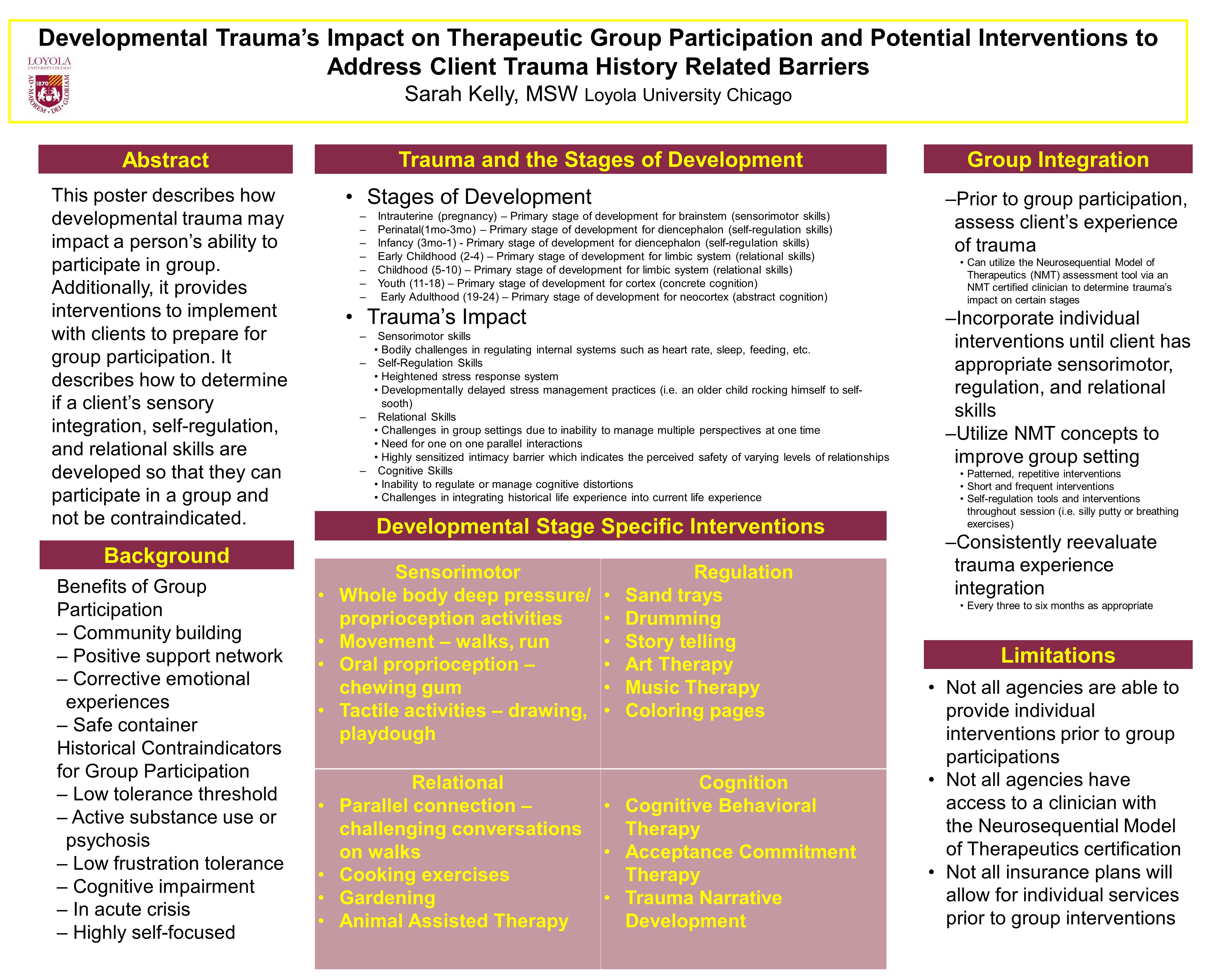Developmental Trauma’s Impact on Therapeutic Group Participation and Potential Interventions to Address Client Trauma History Related Barriers
Sarah Kelly, Loyola University Chicago, Chicago, IL (USA)
This poster describes how developmental trauma may impact a person’s ability to participate in group. Additionally, it provides interventions to implement with clients to prepare for group participation. It describes how to determine if a client’s sensory integration, self-regulation, and relational skills are developed so that they can participate in a group and not be contraindicated.
View PDF of Poster / To learn more, download the Presentation Handout.
Presentation Description:
Group treatment interventions are regarded as beneficial methods of treating psychosocial challenges. Some benefits of group therapy include the opportunity for members to meet others with similar challenges, the ability to see dynamics members experience in their lives occur in a safe container, and the space to build community (Gitterman & Salmon, 2008). While group interventions can be regulatory, emphasis is placed on group composition. Group workers are conscious of qualities that are potentially detrimental to the group and may contraindicate certain individuals for group intervention. Some examples of individuals who may be barred from group interventions are those who cannot tolerate group settings, abide by group contracts, are in acute crisis, have low frustration tolerance, are self-focused, are cognitively impaired, are actively experiencing addiction, have psychotic symptoms, or cannot tolerate ambiguity (Flores, 2007). These individuals may also remove themselves from group settings due to challenges groups present (MacNair & Corazzini, 1994). While it is true that individuals who exhibit these behaviors may be detrimental to the group, it is not true that these individuals need always be unable to participate in group. With the appropriate treatment interventions and preparation, it is possible that those who could not participate in group may eventually participate in group therapies (Flores, 2007).
Recently, research has revealed that developmental trauma can impact a person’s ability to engage in groups (Perry & Szalavitz, 2017). The time a trauma occurs in a person’s life can impact that person’s neurodevelopment. Those who experience trauma anytime between the intrauterine period of development and early adulthood, the time that the brain is primarily developing, may experience negative consequences in their sensory integration, self-regulation, relational, and cognitive skills (Perry & Dobson, 2013). If an individual experienced a significant trauma that impacted their sensory integration, self-regulation, or relational skills, it is likely that person will experience challenges in a group setting. The challenges they experience may present as sensitization to verbal communication, an inability to regulate when experiencing negative feelings, challenges in adhering to group contracts, and many of the other contraindicating factors described above. (Perry & Szalavitz, 2010). While these individuals may experience barriers to group modalities, the plasticity of the brain allows for interventions to be implemented so that these skills can reach typical development (Perry & Dobson, 2013).
This poster aims to explore the impact of developmental trauma on an individual’s ability to engage in group treatments. By assessing an individual’s trauma in relation to their development, social workers are able to support them in their overall healing with a goal of better relational health. Some examples of interventions that can be implemented to prepare for groups include massage, meditation, art therapy, movement therapy, play therapy, etc. While not all people are ready or able to participate in groups, all humans are inherently relational (Perry & Szalavitz, 2010). By working with clients to prepare them to participate in groups, social workers can honor this relational need and hopefully prepare them for more future success.
References:
- Flores, P. J. (2007). Group psychotherapy with addicted populations: An integration of twelve-step and psychodynamic theory, (3rd edition). Binghamton, NY: The Haworth Press.
- Gitterman, A. & Salmon, R. (2008). Encyclopedia of Social Work with Groups. New York, NY: Routledge.
- MacNair, R.R. & Corazzini, J.G. (1994). Client factors influencing group therapy dropout. Psychotherapy 31(2), 352-362.
- Perry, B.D. & Dobson, C. (2013) Application of the Neurosequential Model (NMT) in maltreated children. In J. Ford & C. Courtois (Eds.) Treating complex traumatic stress disorders in children and adolescents. New York: The Guilford Press.
- Perry, B.D. & Szalavitz, M. (2017). The boy who was raised as a dog: And other stories from a child psychiatrist’s notebook—what traumatized children can teach us about loss, love and healing (3rd ed.). New York: Basic Books.
- Perry, B.D. & Szalavitz, M. (2010). Born for love: Why empathy is essential – and endangered. New York: HarperCollins Publishers Inc.
View PDF of Poster / To learn more, download the Presentation Handout.


Sarah- I think you make a valid point that group work intervention could benefit these clients, but due to their past struggles with trauma it may be complicated for them to engage with a group experience. The methods you identify to prepare them for group connection (meditation, art therapy, etc) make sense. Interesting poster!